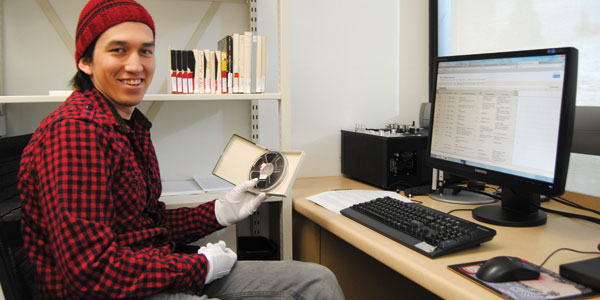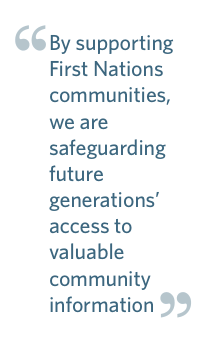
Dustin Rivers is helping digitize First Nations oral histories.
An innovative UBC Library project is helping preserve First Nations history and culture for the digital age.
The project, dubbed Indigitization, is a collaboration between various UBC units, including the Library’s Irving K. Barber Learning Centre, the First Nations House of Learning, the Museum of Anthropology (MOA) and the School of Library, Archival and Information Studies. The First Nations Technology Council and three First Nations communities in B.C.— Heiltsuk, Ktunaxa and ‘Namgis — are also partners in the endeavor.
 One of the project’s key goals is the development of an online “toolkit” for the digitization of First Nations cultural materials, which should be available by May.
One of the project’s key goals is the development of an online “toolkit” for the digitization of First Nations cultural materials, which should be available by May.
The kit is a how-to resource, with equipment and software available for lending to participating communities.
“We have been developing a portable digitization system for First Nations communities. This system will assist them in preserving and digitizing their own valuable oral histories and language recordings,” says Dustin Rivers, an intern at MOA involved with the Indigitization project. “These recordings carry valuable information and histories about our ancestors. Through digitization they can be preserved and accessed by researchers and community members for generations to come.”
“By supporting First Nations communities, we are safeguarding future generations’ access to valuable community information,” adds Mimi Lam, a Digital Projects Librarian based at the Learning Centre.
Thanks to the toolkit, the Ktunaxa Archives was able to digitize an 1894 dictionary of the Kootenay language. “The original manuscript and printed copies had been lost to time and fire,” explains Margaret Teneese, Ktunaxa Archivist. The project, however, allowed Teneese to digitize six reels of microfilm dealing with language records — and amazingly, one of those contained an English translation of the dictionary, a discovery that Teneese calls “an incredible treasure.”
This story first appeared in UBC Library’s Community Report (2012).